- Economical, accurate and simple method to find common causes of overheating
- Pinpoints external leaks caused by loose clamps or leaky hoses, connectors, water pumps or radiators
- Diagnoses internal leaks caused by a blown head gasket or damaged block or head
- Tests radiator and coolant bottle caps to ensure they are maintaining the correct pressure
- Contains adapters to test the cooling system and caps of most U. S. and Asian cars and light trucks, as well as many European vehicles
- Application-specific adapters fit the radiator or coolant bottle like the original cap
-
Information
-
Twitter
-
Pinterest
-
Youtube
-
Facebook
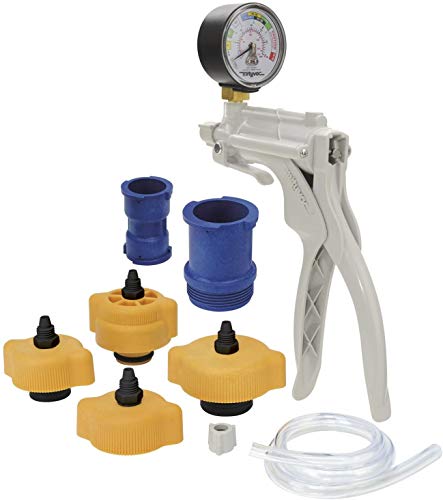
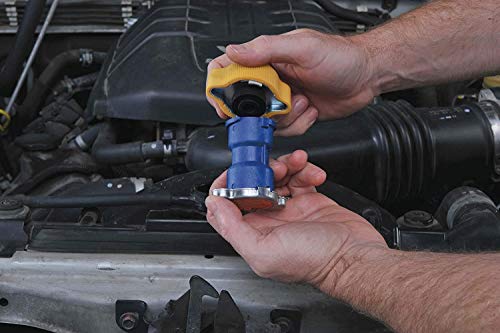
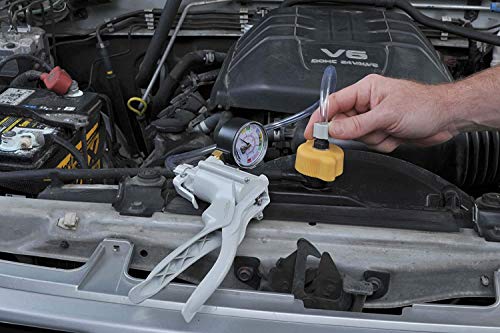
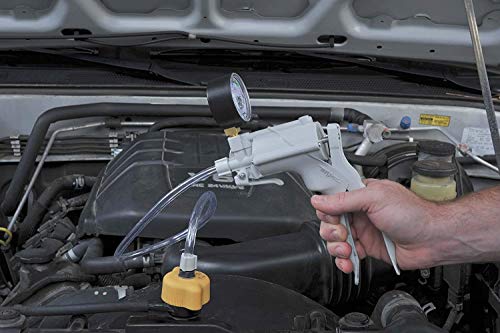
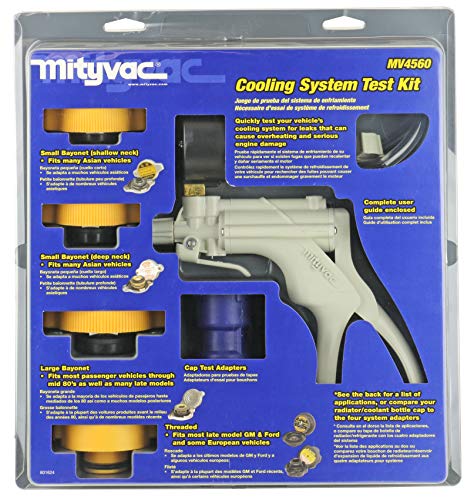

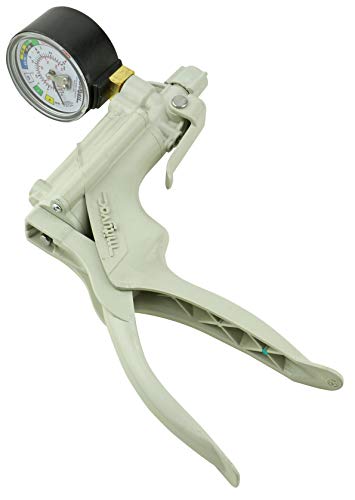
Sally Tanoshii
Satisfied customer
After misdiagnosing a cooling system leak in our 1991 Miata project car a couple of times I realized I should have the system pressure tested, but didn't want to spend the cash on someone else doing the job if I could find an inexpensive way to do it myself. After all, I've been doing all the work on fixing the car up myself, from reupholstering the seats and adding seat heaters to replacing the convertible top to replacing a warped cylinder head, so why not do the pressure test myself? So I did a search and found the Mityvac MV4560. Reviews were mostly positive and the price was less than one hour of auto shop labor, so I bought it. It couldn't be simpler to use. The instruction manual is a bit skimpy, but there's enough information to get you where you need to go. Once I determined which radiator cap fit the car I looked over the directions and pumped the pressure up to the designated level and boom - a tiny fountain of coolant appeared spewing from a pinhole in a hose. Problem solved! Well worth the money for the time and frustration it saved me. I won't be using it every day, so I'm not worried about the plastic construction, but I do wish it included a durable storage case. That's next on my list - finding a cast for storage.
Teri Pierce
Absolutely Fantastic Cooling System Pressure Test Kit - Expectations Exceeded
This is a GREAT cooling system pressure test kit. I had tested my 350Z with a kit I purchased at a national tool store and it would not hold pressure, but I could not find a leak. Then I tested the system with a seemingly high quality kit loaned from national auto parts chain and it would not hold pressure. Still could not find a leak. Used the MityVac pressure tester and the system held specified pressure for 5 minutes - rock solid. The system is easy to set-up and use. Took me less than 10 minutes from the time I took it out of box to complete the test. Very intuitive design. Every other kit had me put multiple parts together just to connect to the cooling system and obviously they were not pressure tight seals. Wasted a week chasing a non existent leak in the cooling system after changing the upper radiator hose. Absolutely great purchase. Exceeded my expectations for a tool this inexpensive. (Now I plan to purchase the MityVac brake bleeding vacuum kit and hope it is equally fantastic.)
Nancy Reis
Wonderful
I originally bought to identify source of coolant leak. Oh, radiator separating from core. I suspected as much, as only sometimes the vehicle's cooling system would equalize to atmospheric pressure and push coolant out of the overflow. After servicing the entire cooling system, I pressurized it again, and this guy found a little leak from a hose that just wasn't quite seated correctly. Saved me time and frustration. It's a bit embarrassing, but it happens with some of these rough cut aftermarket radiator hoses that aren't extruded quite right. It doesn't take that many pumps to pressurize to 18PSI. Only a couple of minutes. If you can turn wrenches, you can pressurize your cooling system. Definitely not shop grade, but great for the hobbyist.
Lori Peeples
Problem SOLVED in 2 minutes with the Mityvac.
Bought the tool to diagnose an undetectable coolant leak in my 180,000 mile 1998 Toyota 4runner. Less than 2 minutes after hooking up the Mityvac and approximately 4 pumps of pressure the leaking hose shot out a stream of coolant that almost landed in my eye, problem solved. I struggled for weeks and could never find the leak with the engine running because the problematic hose was underneath the air intake, dripping onto the top of the motor and evaporating before I could detect it. After replacing the leaking hose I was able to test the cooling system again by pumping it up to 17psi per the instructions in the Toyota service manual. Including the cost of the Mityvac, the new hose, engine coolant and distilled water the repair cost less than $100 and took very little time to complete. Now I'm back on the road with confidence and most importantly my wife is no longer afraid to ride in or drive the vehicle. My goal is to get at least 200,000 miles from the 4runner because it still looks and runs great. I also own the MityVac brake bleeding tool and highly recommend it as well for the ease of bleeding your brake lines without the aid of another person as I've had to do in the past.
Cory D Young
Has saved the day several times
I have used this to find a leak in the water pump gasket of a Chevy S10 with V6 Vortec, to find a radiator hose leak in a chevy 5.7l and to diagnose a head gasket leak in a chevy 5.7l. I also checked out a Ford 3500 and found it sound and have pressure tested several radiator caps. I have not used it on an imported vehicle. It is easy to inadvertently hit the relief valve while pumping the unit but you learn not to do that quickly as it takes some effort to get up to 17 psi or so. Well worth the investment
Hani Jasmin
Five Stars
Was a little hesitant due to it being mostly Plastic but it worked perfectly.
Felipe Aya Sanchez
Works great
Used it to diagnose a leaking radiator on my Dodge minivan - worked great. After first few pumps I saw right away I had a small crack in the plastic part of my radiator where fluid was squirting out. I've seen people concerned that there is no molded case. However, the item comes in a plastic molded deal that holds all the pieces nicely - but uncovered. I set it in a rollaway tool chest for storage and that will be perfect for me. Otherwise you could use the Amazon box the item comes in for storage. Not fancy, but good enough. The item utilizes a plastic tube for connecting the pump to the assorted caps. I could see the ends on that wearing out over time if you use this on a frequent basis. You could cut the ends off whenever that happens, but after doing that a few time the hose would be too short to use - so if you plan on using this a lot you'll probably be needing to buy more hose eventually. Also they include two hose-attachment caps and a spare. They also include a manual that shows you which cap to use on what vehicle - but there are only four caps and you don't really need calibrated eyeballs to figure out which one you need. It would've been nice if they had included what pressure your cooling system uses in the manual, but they probably didn't for liability reasons so if you blow a hose you can't blame them. I think you can get the cooling system pressure off a label under the hood or off the radiator cap. I just figured 15 psi for my car because that is what I heard once was pretty standard. It didn't matter anyway for me because at about 4 PSI it was pretty clear where the leak was. The item seems well built and should last a long time for people using it for personal use. I don't know if I'll ever need it again, but it's cheaper to buy this than have the car diagnosed by a mechanic.
Irene Maciulis
Great for the home mechanic.
I'm giving this 5 stars from a home mechanic point of view. A professional might rate it a star or two less. It works as advertised, and is perfect for the home mechanic that can't justify something more expensive. I was able to do static (engine off) and dynamic (engine running) tests to troubleshoot an engine that was losing coolant and showing trace amounts in the engine oil analysis samples. Is this product the best there is out there. Nope. A professional mechanic would probably buy a more expensive kit that would hold up better in the long run during regular use. But this one works perfect for the home mechanic. It's made of a tough composite material, not aluminum or steel, but I feel it will hold up well for a home mechanic's limited use. It feels sturdy, not cheap or that it would break easily. As a bonus it has a radiator cap test adapter, which is not found on even some more expensive kits.
Tonia Willie Caudle
Decent Tester Kit
Needed something to pressurize a chevy system that was refusing to give up an air bubble, and this worked fantastically. Was able to burp it and get the truck to stop overheating in traffic. As someone who works on quite a few vehicles, though I'm not a professional, this was ideally priced and suitable for what all I do. I work on upwards of 20+ different vehicles regularly, and there is some change/rotation on them too as family buy new vehicles and things. It's not a pro shop by any means, but we do pro level work and diagnostics, and so we try to buy tools on a budget. This was a perfect purchase choice.
Maani Khan
Nice test kit
Bought this as a solution to pressure test a snowmobile cooling system. The recommended Stant adapter was junk (I am being very kind) so purchased this kit as an alternate method. It works well. Has two of the small neck adapters, one shallow and one deep. It also has the ability to test traditional radiator necks as well as adapters for various caps. This kit will cover most applications for the DIY person. If more options are needed I suggest adding a Stant kit and their specific adapters.